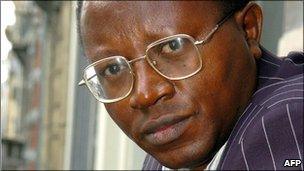DR Congo: Floribert Chebeya killers sentenced to death
- Published

Floribert Chebeya, murdered a year ago, received regular threats in his 20-year career
A military court in the Democratic Republic of Congo has sentenced to death four policemen for killing a prominent human rights activist.
Floribert Chebeya, head of the Congolese charity Voice of the Voiceless, was murdered last June.
His body was found in the back of his car near the Congolese capital, Kinshasa, after he had been summoned to police headquarters.
Three of those sentenced to death were convicted in their absence.
According to the AFP news agency, the court heard that they were the actual killers of Mr Chebeya and were still on the run.
The court jailed another policemen for life, while three were acquitted.
Kinshasa-based correspondent Jonny Hogg told the BBC's Focus on Africa programme that hundreds of people turned out at the Makala central prison in Kinshasa to hear the verdict, which took several hours to read out.
Col Daniel Mukalay, the chief of police intelligence at the time of Mr Chebeya's death, was the highest-ranking of the five policemen in the dock.
He received the death penalty for planning and directing the assassination, AFP reports.
The death penalty has not been carried out since President Joseph Kabila took power in 2001, the agency says.
Bound and gagged
Mr Chebeya, a frequent critic of the government, received regular threats in a career spanning more than 20 years.
On the day he disappeared, Mr Chebeya sent a text message to his wife saying that he was at the police headquarters for the meeting he had set up with police chief John Numbi, but was not heard from again.
The meeting with Gen Numbi never took place and his body was later found bound and gagged in the back of his car.
Mr Chebeya's driver, Fidele Bazana, is still missing.
Gen Numbi was suspended as police chief over the affair but did not face any charges.
Human rights activists are frequently harassed in DR Congo and the death of Mr Chebeya prompted widespread international criticism.